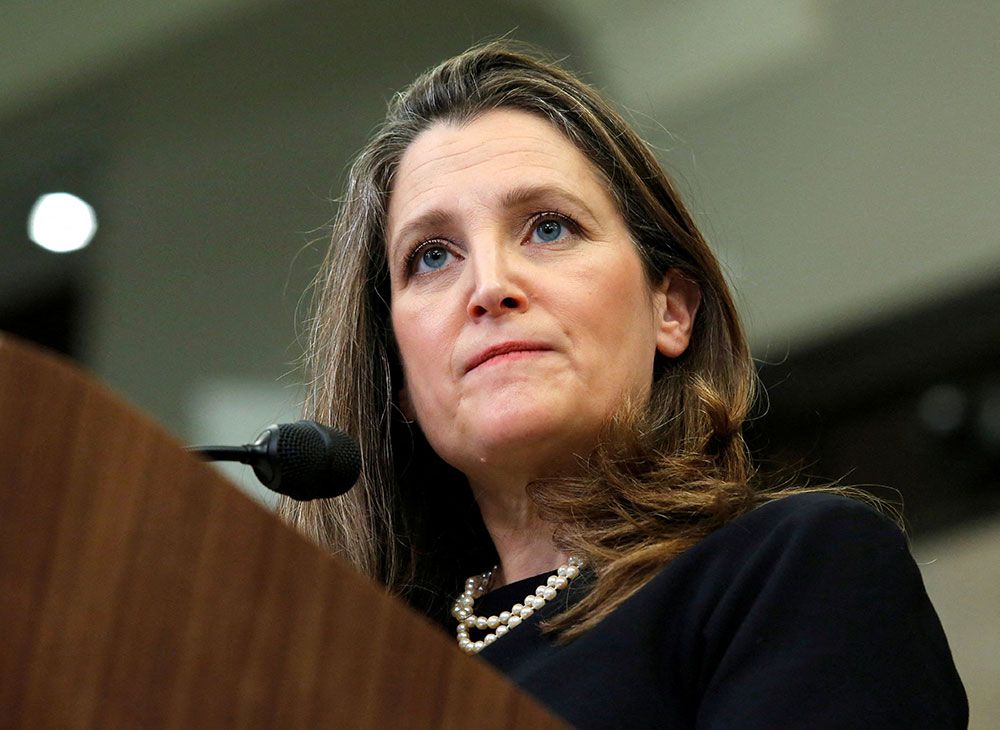Measures include more money for low-income workers, seniors, parents and renters struggling with housing costs

Article content
Deputy Prime Minister Chrystia Freeland on Thursday outlined the federal government’s $8.9-billion “Affordability Plan” that’s supposed to help Canadians shoulder the rising costs of living as inflation reaches multi-decade highs.
Advertisement 2
Article content
“Because of investments we have already made in the last two federal budgets, a new set of measures is coming into force right now to help the Canadians who need it most,” Freeland said during a keynote speech at the Empire Club of Canada. “This is $8.9 billion in new support for Canadians this year. This is our Affordability Plan.”
The Affordability Plan provides $1.7 billion in new support for workers. It includes enhancements to the Canada Workers Benefit, giving $2,400 to low-income workers starting this year; a 10 per cent increase to Old Age Security for seniors older than 75, which is expected to give three million seniors $766 or more; and a one-time $500 payment to one million Canadian renters struggling with housing costs.
Advertisement 3
Article content
It will also cut child-care fees by an average of 50 per cent; provide a dental care plan for Canadians earning less than $90,000 starting with children under 12; and index the $15-an-hour federal minimum wage to inflation.
Freeland said the new support may rub some hawkish economists the wrong way.
“But for the fiscal hawks among you, fear not,” she said in her speech. “This is new money for the Canadians receiving it this year, but we built these measures into our last two budgets.”
The affordability plan is one portion of a five-part strategy to help the economy recover from the COVID-19 recession that Freeland laid out during her speech on the economy. The other parts of the plan included focusing on the role of the Bank of Canada, fiscal restraint, addressing worker shortages and creating good jobs.
Advertisement 4
Article content
The deputy prime minister emphasized the role the country’s central bank plays in targeting inflation through its mandate, adding it will need the help of government policy to tackle supply constraints. She also shot back at the criticism the central bank has received from opposition parties in recent months.
“At this time of global economic and political volatility, undermining Canada’s fundamental institutions — very much including the Bank of Canada — is highly irresponsible, not to mention economically illiterate,” she said.
Freeland also talked about fiscal restraint, noting the federal government spent an “extraordinary amount of money” to get through the pandemic. She pointed out Canada has the lowest debt-to-GDP ratio among its G7 peers, and added that both the Bank of Canada and the government are working to withdraw monetary and fiscal stimulus.
Advertisement 5
Article content
“I am determined to see our debt-to-GDP ratio continue to decline and our deficits continue to be reduced,” she said. “Our pandemic debt must — and will — be paid down. In tabling the budget in April, I reaffirmed this as our fiscal anchor, and I committed to a review and a reduction of government spending, because that is the responsible thing to do.”
-

A lot must go right to achieve soft economic landing, David Dodge says
-

Fed, Bank of Canada will ‘do whatever it takes’ to curb inflation: Benjamin Tal
-

Canadian homeowners feeling the pinch of rising rates: Manulife Bank debt survey
The April 7 budget had less spending than expected at $452 billion, following a massive pandemic response over the past few years. Fiscal balance sheets are steadily improving, so much so that the government is foregoing revenue-producing strategies such as its ultra-long bond issuance, which was cancelled last week.
Advertisement 6
Article content
Freeland also emphasized the importance of addressing the worker shortage through the government’s plan to invest in immigration, skills and training, affordable child care to help women participate in the workforce, as well as affordable housing. The federal government’s plan also includes ensuring there are enough good jobs for middle-class families.
Randall Bartlett, senior director of the Canadian Economics team at Desjardins Group, said these new measures are a positive for households struggling with inflation.
“First and foremost, that’s number one, recognizing that it’s an issue and making sure that they demonstrate to Canadians that they’re taking it seriously and doing something about it,” he said, adding that his second-biggest takeaway was recognizing the independence of the Bank of Canada.
Advertisement 7
Article content
“In the context of the high inflation that we’re seeing right now, providing that sort of targeted support as a bit of a bridge for lower-income households to shore up their finances to some extent throughout this period of high inflation and rising interest rates is going to be a welcome development for a lot of those households.”
Bartlett also pointed to Canada’s AAA rating as an important highlight in the speech.
As the country stares down a new wave of global challenges, former Bank of Canada governor David Dodge this week noted that achieving a soft landing with the least amount of pain to the Canadian economy will be a challenge policymakers must navigate. In Thursday’s remarks, Freeland echoed those sentiments, but said a soft landing is not guaranteed.
“We have been through two years of remarkable turbulence,” she said. “Our challenge now is to land the plane. A soft landing is not guaranteed. But, fortunately for us, there is no country in the world better placed than Canada to achieve one.”
• Email: shughes@postmedia.com | Twitter: StephHughes95


